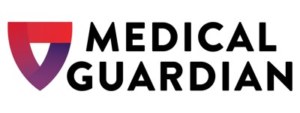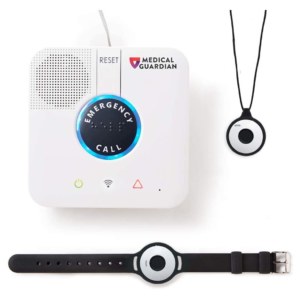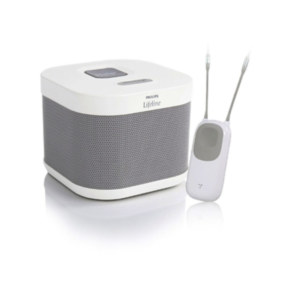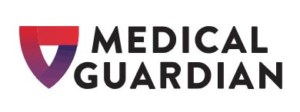Medical Guardian Vs. Philips Lifeline
The experts at AgingInPlace.org compared two well-known medical alert brands—Medical Guardian vs. Philips Lifeline. Both have similar products, services, and prices. But when you take a closer look at the fine print, one company emerges as a better deal all around.
Key Takeaways
- Medical Guardian and Philips Lifeline are both established companies in the medical alert industry.
- Both companies have at-home and mobile devices with 24/7 monitoring and competitive monthly fees.
- Medical Guardian requires an equipment fee on some of its products but does not charge for activation or installation.
- Philips Lifeline charges activation and installation fees on most of its products.
- Medical Guardian offers more add-on services than Philips Lifeline.
- Automatic fall detection comes standard with Philips Lifeline’s mobile device.
- Philips Lifeline doesn’t require a contract, but Medical Guardian requires a three-month service commitment.
Overview for the Medical Guardian vs. Philips Lifeline
Medical Guardian and Philips Lifeline are both established medical alert system companies—Medical Guardian was founded in 2005 and Philips Lifeline in 1974. In fact, Philips Lifeline was the first personal alert service in North America and claims to be the No. 1 provider of medical alert systems with the largest subscriber base, while Medical Guardian boasts of being one of America’s fastest-growing companies.
Both companies have similar medical alert offerings—24/7 emergency monitoring service, at-home and mobile devices, landline and cellular service, fall detection, and competitive pricing.
Neither company requires a long-term contract, though Medical Guardian does require a 90-day commitment from users, which can cause headaches if you cancel service before that time. Each company also requires different fees for service on some of its products, such as for equipment, activation, and/or installation—a factor that helps even the playing field between Medical Guardian vs. Philips Lifeline.
After looking at customer reviews, talking to sales representatives, and considering the products and services, we found a clear winner between the two. Keep reading to learn more.
Medical Guardian vs. Philips Lifeline Comparison
| Monitoring Service Hours | |
| MEDICAL GUARDIAN | 24/7 |
|---|---|
| PHILIPS LIFELINE | 24/7 |
| Monthly Cost | |
| MEDICAL GUARDIAN | $29.95-$39.95 (discounted for annual payment plan) |
|---|---|
| PHILIPS LIFELINE | $29.95-$58.95 |
| Equipment Cost | |
| MEDICAL GUARDIAN | $124.95 for cellular at-home systems ($0 with landline) $199.95 for smartwatch |
|---|---|
| PHILIPS LIFELINE | $99.95 for On the Go system $0 for at-home systems |
| Activation Fee | |
| MEDICAL GUARDIAN | $0 |
|---|---|
| PHILIPS LIFELINE | $50, at-home systems $0 for On the Go system |
| Installation Fee | |
| MEDICAL GUARDIAN | $0 |
|---|---|
| PHILIPS LIFELINE | $19.95 self-installation $99 technician installation |
| Range (In-Home Base Unit) | |
| MEDICAL GUARDIAN | 1,400 feet |
|---|---|
| PHILIPS LIFELINE | 500 feet Up to 1,500 feet with Voice Extension (additional $10 per month) |
| Battery Life | |
| MEDICAL GUARDIAN | 32-hour backup battery for in-home Five days for Mobile 2.0 and Mini Guardian Up to 24 hours for MGMove Smartwatch |
|---|---|
| PHILIPS LIFELINE | 30-hour backup battery Automatic battery replacements when needed Up to five days for mobile devices |
| Fall Detection Option | |
| MEDICAL GUARDIAN | Yes |
|---|---|
| PHILIPS LIFELINE | Yes |
| Contract | |
| MEDICAL GUARDIAN | No long-term contracts, but the company has a 90-day commitment to service. |
|---|---|
| PHILIPS LIFELINE | No. You can cancel anytime for a full refund, but pendants must be returned within 30 days of purchase. |
| Connection Type | |
| MEDICAL GUARDIAN | Cellular or landline |
|---|---|
| PHILIPS LIFELINE | Cellular or landline |
| Water-Resistant | |
| MEDICAL GUARDIAN | Yes |
|---|---|
| PHILIPS LIFELINE | Yes |
| GPS Tracking Option | |
| MEDICAL GUARDIAN | Yes |
|---|---|
| PHILIPS LIFELINE | Yes |
| Two-Way Voice Communication Available | |
| MEDICAL GUARDIAN | Yes |
|---|---|
| PHILIPS LIFELINE | Yes |
| Mobile App | |
| MEDICAL GUARDIAN | Yes |
|---|---|
| PHILIPS LIFELINE | Yes |
| Optional Monthly Add-Ons | |
| MEDICAL GUARDIAN | Fall detection: $10 per month Lockbox: $2.99 per month OnGuard Alerts: $2.99 per month Wireless wall button: $2.99 per month Voice-activated wall button: $4.99 per month Protection plan: $6.99 per month Alert 911: $9.99 per month |
|---|---|
| PHILIPS LIFELINE | Voice extension: $10 per month Lockbox: one-time cost of $29.95 |
| Special Features | |
| MEDICAL GUARDIAN | Jewelry accessory available to disguise wearable pendants for the fashion-conscious New smartwatch option One of the longest home-base unit range in the industry Longest battery life—up to 168 hours Updated MyGuardian care portal brings safety and health information together in one place |
|---|---|
| PHILIPS LIFELINE | Philips Cares mobile app connects care recipient and caregivers Three fall detection technologies designed to trigger fewer false alarms Multiple advanced locating technologies Mobile device includes automatic fall detection |
Medical Guardian gives a good first impression with a transparent, easy-to-navigate website that clearly states its products and services and their price tags. This is a pleasant surprise since some companies have hidden costs, and others won’t reveal that information without requiring you to call and endure a full-blown sales spiel. A call to Medical Guardian’s customer service number was quickly responded to by a friendly and knowledgeable sales representative who was only moderately pushy.
The company has a lot of options when it comes to at-home and mobile devices, including offering one of the longest ranges of up to 1,400 feet for its at-home device. Some products require an equipment fee, but there are no other up-front costs like installation or activation fees. Medical Guardian recently released a new product—the MGMove Smartwatch. The watch is a more discreet way for active seniors to wear a medical alert button.
Medical Guardian also offers a laundry list of monthly add-on features, such as fall detection, lockbox, wireless or voice-activated wall buttons, and so on. But those fees can add up, making that competitive monthly cost a lot less attractive. Another word of caution, Medical Guardian requires a 90-day service commitment, which means canceling the service before that 90-day period may leave you with a full three months in service charges.
Pros
-
Free activation and installation
-
Several add-ons available for most units, including wireless wall buttons and voice-controlled help buttons
-
One of the longest ranges for at-home base unit in the industry—up to 1,400 feet
-
New customer care portal provides a central location for the care recipient’s health and safety information
Cons
-
There’s a 90-day minimum commitment for service, which can make early cancellations a pain
-
Some plans require an equipment fee
-
A restocking fee may be charged when service is canceled
| Medical Guardian |
| Classic Guardian (In-Home, Landline) | |
| Monthly Cost | $29.95 |
|---|---|
| Activation/ Installation Fee | $0 |
| Equipment Fee (one-time fee) | $0 |
| Home 2.0 (In-Home, Cellular) | |
| Monthly Cost | $34.95 |
|---|---|
| Activation/ Installation Fee | $0 |
| Equipment Fee (one-time fee) | $124.95 |
| Mini Guardian (On-The-Go) | |
| Monthly Cost | $39.95 |
|---|---|
| Activation/ Installation Fee | $0 |
| Equipment Fee (one-time fee) | $124.95 |
| Mobile 2.0 (On-The-Go) | |
| Monthly Cost | $39.95 |
|---|---|
| Activation/ Installation Fee | $0 |
| Equipment Fee (one-time fee) | $124.95 |
| MGMove Smartwatch | |
| Monthly Cost | $39.95 |
|---|---|
| Activation/ Installation Fee | $0 |
| Equipment Fee (one-time fee) | $199.95 |
Philips Lifeline offers two at-home options and one mobile device but no smartwatch option. The company’s monthly fees are higher than Medical Guardian, and an activation fee or an installation fee is required for most Philips units. The installation fee covers the cost of professional installation, which can be handy but pricey. If you’re more technically inclined, you can get a substantial discount if you install the system yourself.
Only the On the Go device requires an equipment fee. One potential cost-savings option is that eligible Humana Medicare Advantage customers can receive Philips Lifeline equipment and monthly service for free.
On the downside, the at-home system’s base unit only has an 500-foot range, which is one of the shortest ranges among medical alert systems. A voice extension unit is available for an extra monthly fee, which extends the range to 1,500 feet.
Another plus, Philips Lifeline has put a lot of effort into the technology of its devices. For example, its automatic fall detection uses three different technologies designed to trigger fewer false alarms. Fall detection is available as an add-on service for the at-home units and comes standard with the On the Go model. The mobile device also uses multiple advanced locating technologies to better pinpoint the user’s location in the event of an emergency.
Here’s something you’ll only find in the fine print of your Philips Lifeline agreement. If you choose not to enroll in Auto Pay, you will be charged a “nominal” invoice fee to offset a portion of the costs associated with printing and mailing paper invoices and processing checks. That may be an issue for anyone who prefers to pay with paper checks rather than electronic payments.
We wanted to confirm that detail, so we made a call to Philips Lifeline’s customer service number. After being placed on hold for about seven minutes, we were connected with a very friendly and personable representative. Unfortunately, she had never heard of the invoice fee. She sent a message to her supervisor for clarification, but as of the publication date of this article, she had not responded to us about the invoice fee.
Pros
-
There is no long-term contract
-
Several technologies help fine-tune fall detection and location services
-
Fall detection is standard in mobile devices
-
Eligible Humana Medicare Advantage customers can receive Philips Lifeline equipment and monthly service for free
Cons
-
Activation and installation fees are required on HomeSafe Standard and HomeSafe with AutoAlert
-
The mobile device requires an equipment fee and installation fee but no activation fee
-
There’s a nonspecific invoice fee for those who do not enroll in Auto Pay
-
At-home bases have an 500-foot range, which is shorter than many other systems
-
A restocking fee may be charged when service is canceled
| Philips Lifeline |
| HomeSafe Standard (Landline) | |
| Monthly Cost | $29.95 |
|---|---|
| Activation Fee (one-time fee) | $50 |
| Installation Fee (one-time fee) | |
| Equipment Fee (one-time fee) | $0 |
| HomeSafe Standard (Cellular) | |
| Monthly Cost | $43.95 |
|---|---|
| Activation Fee (one-time fee) | $50 |
| Installation Fee (one-time fee) | |
| Equipment Fee (one-time fee) | $0 |
| HomeSafe With AutoAlert (Landline, Fall Detection) | |
| Monthly Cost | $44.95 |
|---|---|
| Activation Fee (one-time fee) | $50 |
| Installation Fee (one-time fee) | |
| Equipment Fee (one-time fee) | $0 |
| HomeSafe With AutoAlert (Cellular, Fall Detection) | |
| Monthly Cost | $58.95 |
|---|---|
| Activation Fee (one-time fee) | $50 |
| Installation Fee (one-time fee) | |
| Equipment Fee (one-time fee) | $0 |
| On The Go | |
| Monthly Cost | $49.95 |
|---|---|
| Activation Fee (one-time fee) | $0 |
| Installation Fee (one-time fee) | |
| Equipment Fee (one-time fee) | $99.95 |
Similarities and Differences Between Philips Lifeline vs. Medical Guardian
There are a lot of similarities between Medical Guardian vs. Philips Lifeline. For starters, both medical alert companies have been around for several years and have established themselves as leaders in the industry. Both also offer 24/7 monitoring service with at-home and mobile devices, and each of their systems comes with competitively priced monthly fees. Both also offer fall detection, but this feature is an additional monthly cost for Medical Guardian’s mobile systems.
The big difference between the two companies is that Philips Lifeline does not require any long-term contracts, and cancellations are relatively easy, whereas Medical Guardian requires a three-month service commitment, and cancellations may result in restocking fees.
What Customers Are Saying about Both Brands
Medical Guardian Customer Reviews
“I called because my device was not working. I was very upset. I spoke with Esi … I pray I got her name correctly. She was absolutely wonderful! She was patient, informative, fun, and did not make me feel stupid. What a gift for any company. I wish I could hire her!!! I have had this device for years and she is the first person that walked me through exactly how to use it and troubleshoot when I have a problem.”
M. Bilal, Trustpilot, 1/14/21
“Love the service. Quick response time and helpful friendly people. I feel more confident that my mom will have the help if she needs it.”
P. Reck, Trustpilot, 9/22/20
“I purchased this for my mother-in-law on October 6, and the setup process and service was great. At the time of purchase, I paid for 90 days of service as is the policy. Sadly, my mother-in-law passed away on 11/9, barely a month into that 90 day period. After having returning the unit at my own expense, and confirming it was received on 11/17, I’m now told that Medical Guardian will not refund the prorated amount as it was within ‘the 90 day commitment.’ What kind of policy is this? I understand asking for the first 3 month of payment up front, but to not refund upon the death of a client is reprehensible. Needless to say, I find it unacceptable that I am not refunded for the two months of paid service that were not used after my mother-in-law passed.”
J. Cowart, Trustpilot, 12/15/16
Philips Lifeline Customer Reviews
“After my wife passed away, my daughters said they wanted me to have someone to contact me if I needed help. They investigated Philips Lifeline, and decided it was the very best…so, we called and purchased the unit that will allow me to go anywhere in the United States and have the coverage. When I went to Florida, for my Granddaughter’s wedding, I notified Lifeline to let them know I was in Florida (I live in California). Since my daughters were at the wedding, I had a Responder there, in case they needed to contact Lifeline. THIS IS THE BEST INSURANCE ANYONE TO RECEIVE! I feel I am totally covered for any mishap I may have. I had to wait for my unit to receive, but it was really worth it. I recently discussed this with my sister (who lives alone in another town), and she is going to subscribe for this service. I anyone lives alone it is the best insurance for that person and their family. I would recommend Philips Lifeline to everyone.”
Donald C. BestCompany, three years ago
“Do not use this company. Rude customer service representatives. I cancelled the alert service! Please do not used this company for your love ones!”
Barbara N., Better Business Bureau, 5/27/21
Philips Lifeline vs. Medical Guardian: Who’s the Winner?
Medical Guardian and Philips Lifeline are both long-standing and flourishing companies in the medical alert system industry. Both have similar products and services, including 24/7 monitoring and at-home and mobile devices. In short, you can’t go wrong with either system. However, when comparing Medical Guardian vs. Philips Lifeline, we lean toward Philips Lifeline for a few reasons.
Philips Lifeline doesn’t require any service commitments. While the 90-days that Medical Guardian requires isn’t that long, if you did need to cancel service within that time, you wouldn’t want to be stuck with the fees. Secondly, we look to the professional installation. While a $99 installation fee may seem steep, it ensures your system is set up properly, which is a huge plus for those who are not technically inclined. Those who wish to install the system themselves can do so for a substantially reduced installation fee. Finally, if you are an eligible Humana Medicare Advantage customer, you can get Philips Lifeline equipment and monthly service for free.
However, if your loved one lives in a larger home, the 800-foot range of Philips Lifeline’s base unit may not be enough, and you’ll have to pay extra per month for a voice extension. That may make Medical Guardian’s standard 1,400-range unit more attractive to you. Furthermore, if the care recipient requires more gadgets for their safety, such as voice-activated call buttons or immediate 911 alerts, then Medical Guardian is the way to go.
Why You Can Trust Us
We strive to create honest, helpful reviews backed by firsthand shopping, testing, and research. Our content is medically reviewed and unbiased to help you choose the right medical alert system for you or your loved one.
From over 1,000 hours of research, we choose 11 of the top brands that we believe are the best medical alert systems. We did the following throughout our research process:
- Consulted with geriatricians and adult caregivers
- Mystery-shopped the brands
- Surveyed medical alert system users
- Tested various medical alert systems
- Interviewed experts in the field
- Read hundreds of verified customer reviews from trusted third parties, such as Better Business Bureau (BBB) and Trustpilot
Frequently Asked Questions
-
There are numerous reasons why we prefer Medical Guardian vs. Life Alert. For starters, Medical Guardian doesn’t require any long-term commitments, while Life Alert requires a three-year contract. Secondly, Life Alert doesn’t have fall detection, which Medical Guardian offers as an add-on service with most of its devices. Finally, Medical Guardian is considered by AgingInPlace.org experts to be one of the best medical alert systems in the market.
Pricing is accurate as of March 21, 2022.
WRITTEN BY
Jennifer Walker-Journey is a former Marketing & Communications Director for continuum care facilities where she advocated for the quality care of elderly and disabled individuals living in independent and assisted living facilities, nursing homes, and specialized units for Alzheimer’s and dementia care. She writes extensively about eldercare safety, as well as the safety and efficacy of medications and medical devices designed to help seniors live more independent lives. Much of her research in this arena has focused on hearing aids, medical alert systems, and other devices that help seniors age in place safely and provide peace of mind to caregivers.
MEDICALLY REVIEWED BY
Jenny is an Adult-Gerontology Primary Care Nurse Practitioner in NYC with a passion for working with aging adults and their family members. Prior to her clinical training at Vanderbilt School of Nursing, she worked in business and medical research at Harvard Business School and Massachusetts General Hospital. As a Caregiving Coach at Givers, Jenny helps family members manage the financial, emotional, and educational stresses of caring for their loved ones who are aging in place.







